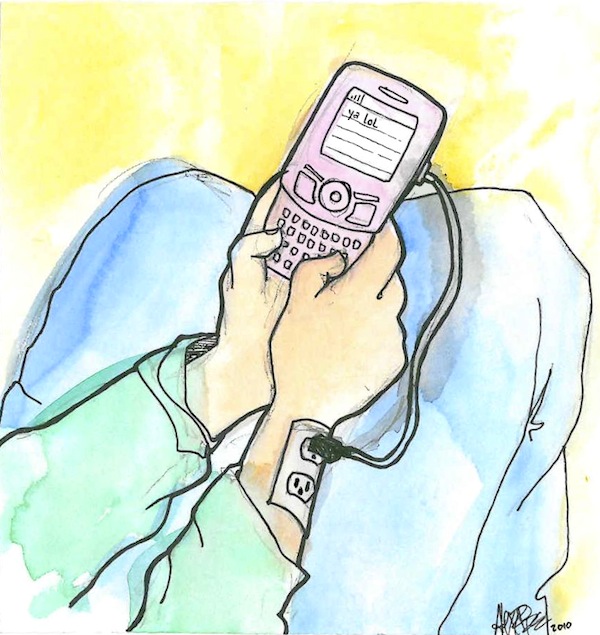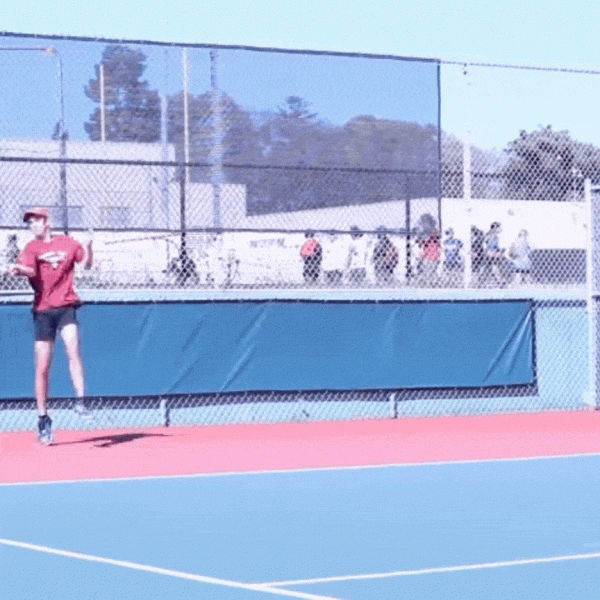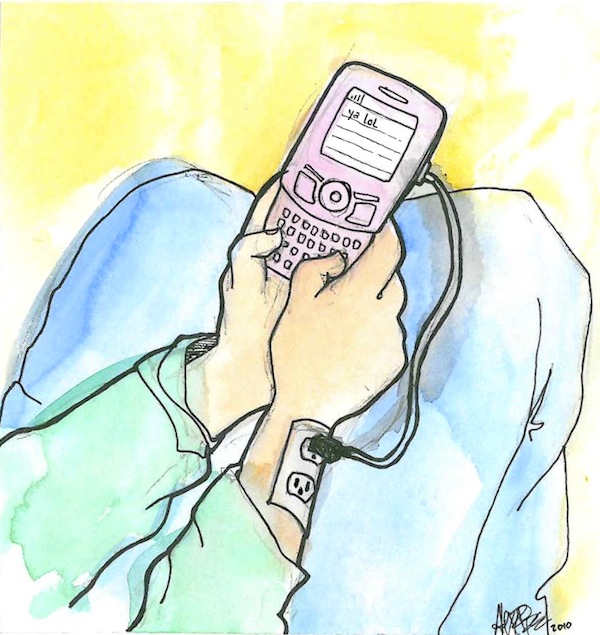
Foothill sophomore Stephen Mariani is enrolled in a tough class schedule, earns excellent grades and is navigating the usual tumultuous waters of adolescence that everyone has to explore. However, he still finds time to text a minimum of 100 texts every day and Facebook late into the night.
“I have it [Facebook] open when I’m writing my essays… it keeps me up doing homework a lot later,” Mariani said.
Newsweek, TechNewsWorld, and CNN have weighed in on a newly defined epidemic now known as hypertexting and hypernetworking.
According to a study performed by Case Western Reserve School of Medicine, hypertexting is defined as sending more than 120 texts during a school day. Hypernetworking is defined as spending more than three hours on social networking sites during a school day.
The study indicates that students who hypertext are more susceptible to developing risky behaviors such as binge drinking, promiscuity, and drug abuse.
Though Mariani hasn’t had an issue with the supposed side effects of excessive texting and networking, he has seen a few changes in his ability to focus on school.
“It definitely distracts me from homework,” he said.
Trying to find acceptance or cheer themselves up, teens text and Facebook more than adults
A Foothill student who requested anonymity commented on the matter through a series of texts to Dragon Press Staff writer Maya Morales:
“I think it’s an interesting topic and I do see the correlation of emotions with the activity level people have in Facebook and texting,” the student wrote.
“I think that is part of the reason people who text more or are on Facebook a lot do those things because they already are trying to find acceptance and some way to cheer themselves up. They have emotional issues they can’t deal with.”
Foothill guidance counselor Steven Boyd finds it hard to believe that it is possible to be this technologically active during a day.
“I’m a little shocked,” Boyd said, “How could you even do that? I don’t know.”
Some students at Foothill believe that hypertexting doesn’t exist at a noticeable level among their friends, but that hypernetworking could be an issue.
Foothill freshman Tara Yanez says that hypernetworking is much more of a problem at the school, serving as a major distraction from other activities.
“I spend three hours on it then I look at my clock and I’m like, ‘Where’s time go?’,” Yanez said.
However, several Foothill students declare that the school is virtually unaffected by hypertexting due to difficult and strict class schedules that many of the students have undertaken.
“Most people don’t text during class because in class if you miss two seconds, you’re kind of screwed for the whole year,” Foothill junior Addison James said.
“I guess people who don’t really care text a lot, but people who do care: they don’t,” she added.
The cause of the new technological ‘affliction’ is still under speculation by researchers, with some claiming that the last generation used the telephone for much the same purposes that teenagers today use texting: discussion of daily events and intimacy, with a degree of anonymity.
Others are under the impression that kids affected by hypertexting or hypernetworking are just not busy enough, suggesting that this may be the reason that Foothill has dodged the bullet.
“I think that students who just sit there all day and night texting probably have too much time on their hands and can get in trouble,” Foothill guidance counselor Debbie Freeman said.
“Students who are doing what they’re supposed to be doing are involved in safe and sane activities like hobbies, sports, and doing homework don’t have time for this excessive texting,” she added.
“Submerged in a digital world,” teens lose awareness of what’s going on
Despite the somewhat sheltered school environment of Foothill, sophomore Alexa Sharpe recognizes that it may be an issue elsewhere.
“In general, I think that it’s [hypertexting] kind of dangerous because you’re so submerged in the digital world that you’re not really aware of what’s going on outside of it,” she said, “That’s why you can’t drive and text at the same time: it causes car accidents.”
Those who agree with the theory of the technological evolution from telephone conversation to text don’t always agree that the text’s convenience is a good thing.
Foothill’s school psychologist Lisa Wofford is concerned for students addicted to Facebook and cell phones. She asserts that ‘Facebooking’ and texting affect school performance and disrupt sleep patterns.
“They [teenagers] feel obligated to respond to the messages late at night,” Wofford said.
She also believes that those who text are missing important cues such as body language and “lose intimacy” with the other person through this form of communication.
However, Dr. John Grohol, a psychiatrist who writes about online behavior and mental health for national publications, suggests that the constant interruptions by technology are not disruptive to the teenager, but actually beneficial.
“If anything, I’d suggest that teens are actually far better managers of such interruptions than most adults, because they are growing up with the technology as a second nature,” he wrote in a November article for Psychcentral.com.
All this texting may “serve a valuable developmental purpose” for teens
“It’s fine to observe these trends and make suppositions about what they mean. But until we have some actual research data, I’m not going to jump the gun and claim all the texting teens are doing is in any way ‘harmful’ or doesn’t serve a valuable developmental purpose,” Grohol said. “Because I very much suspect it does.”
Foothill sophomore Chris Hannah believes there’s an easy explanation.
“I think that people who hypertext seem to have those problems because they just always need something to do.”
Daisy Ahlstone, another Foothill sophomore, would agree.
“It’s [texting] just something I do a lot,” she said. “I have ADHD and get distracted easily so it helps me to be constantly busy doing something.”


















